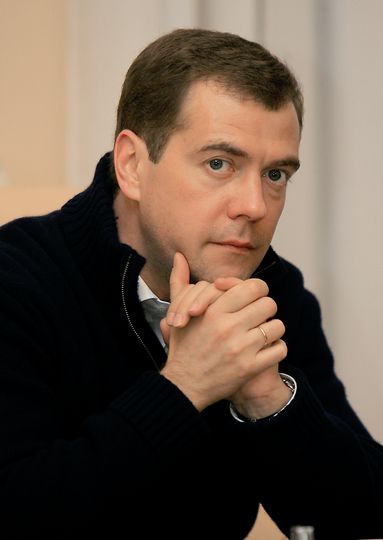That Dmitry Medvedev could become Russia’s next president has been a general belief ever since his promotion from presidential chief of staff to first deputy prime minister. Once an obscure Kremlin functionary, he has now emerged from the shadows to become a politician in the news on all the national channels.
That shift in his career fuelled the assumption that he would be the next man to lead the country.
Medvedev has come a long way from university professor to government official and influential politician.
Dmitry Anatolyevich Medvedev was born on September 14, 1965 in Leningrad (now St Petersburg), the only child in his family. His father, Anatoly, was a professor at a local technology institute, while his mother, Yulia, taught Russian at the Herzen Teacher Training College.
Medvedev spent his young years in a Leningrad suburb, Kupchino, mostly populated by factory workers.
In 1987, he graduated from the Law School of Leningrad State University, and obtained a PhD in 1990. His thesis was devoted to problems of a state-run enterprise as a legal entity. Between 1990 and 1999, Medvedev taught private law at his Law School. He was a CPSU member until the party was dissolved in August 1991.
Medvedev met Anatoly Sobchak, a future mayor of St Petersburg, during his college years. In the spring of 1989, he took part in Sobchak’s election campaign to the Congress of People’s Deputies (the Soviet parliament), and was on Sobchak’s team between June 1990 and January 1991.
It was then that Medvedev made a personal acquaintance with Vladimir Putin, who later described their meeting in his book First Person. “I needed more loyal staff as I worked at the City Hall with Sobchak. So I went to the Law School graduates, and they proposed Dmitry.” Between June 1991 and June 1996, Medvedev served as a legal expert on the public relations committee at the St Petersburg City Hall headed by Putin. He also went on an educational trip to Sweden.
At that time, Medvedev started a business.
He worked as chief legal officer at the joint-venture Ilim Pulp Enterprise, Russia’s biggest paper producer.
In 1998, Medvedev was elected to the board of the Bratsk Timber Processing Company in the Irkutsk Region, East Siberia. In late 1999, he divested himself of his status as co-founder of commercial companies because he was appointed deputy chief of the government staff.
That appointment marked the beginning of Medvedev’s Kremlin career. In February 2000, he headed Putin’s election headquarters and was appointed deputy chief of the presidential staff by President Putin’s decree.
Medvedev reputedly developed the concept of how government bodies can cofound joint-stock companies without infringing the law. “He was one of the first in St Petersburg, if not Russia, to propose a perfectly legitimate way for a government agency to buy into a joint-stock company – by contributing land lease payment, not land itself,” Sankt-Peterburgsky Kuryer wrote on November 6, 2003.
On June 30, 2000, he replaced ex-PM Viktor Chernomyrdin as board chairman of the gas monopoly Gazprom, elected by an annual shareholder meeting. In April 2001, he headed a working group on liberalising the market for Gazprom shares, set up on President Putin’s orders.
In October 2002,Medvedev was appointed to represent the president on the National Banking Council.
A year later he became chief of the presidential staff replacing Alexander Voloshin who had filed his resignation.
Commenting on the decision, President Putin described Medvedev as a man of “liberal and democratic views, devoted to democratic development and market economy in Russia.” However, Medvedev’s liberalism is carefully measured and adjusted to the modern state policy realities. As the head of Gazprom, he mentioned more than once that state companies could be efficient.
In July 2006, he told the Ekspert magazine that he did not think “sovereign democracy” an ideal term. “Any attributes accompanying the word democracy add weird flavours to the concept.” On June 14, 2005, Medvedev left the post of the Kremlin chief of staff to be appointed first deputy prime minister.
In that office, the president entrusted him with drafting a plan to implement national projects (priority social projects in major sectors of the economy, including education and affordable and comfortable housing).
In addition, he was responsible for government policies in education, health care, housing, social and demographic issues, and nature management in the Mikhail Fradkov and Viktor Zubkov cabinets.
Despite his dense schedule, Medvedev never forgot the Law School where he had studied. A few years ago on Freshman Day, a string of balloons was floated in the air with a photocopy of Medvedev’s university diploma attached to it. An award was promised to the person who could catch at least one balloon, the award being enrolment in a free, ninemonth law training programme; however, nobody succeeded in catching a balloon.
In 1989, Medvedev married his former high school classmate. Their son, Ilya, was born in 1996.
His wife, Svetlana, a graduate of an economy and finance college, is currently engaged in social and charity programmes.
She heads the trustee council of the target programme for the spiritual, moral and cultural education of younger generations in Russia, initiated by Patriarch Alexy II.
On January 20, 2008, Medvedev was officially registered to run for the presidency in March. He first appeared in public as a presidential candidate on January 22, at the Civil Forum organised by the Public Chamber. Analysts described his presentation at the forumas a detailed, goal-setting policy speech.
It became known later that month that Medvedev had decided against participating in televised debates with his opponents, opting instead for touring Russia’s regions and holding individual conferences.













